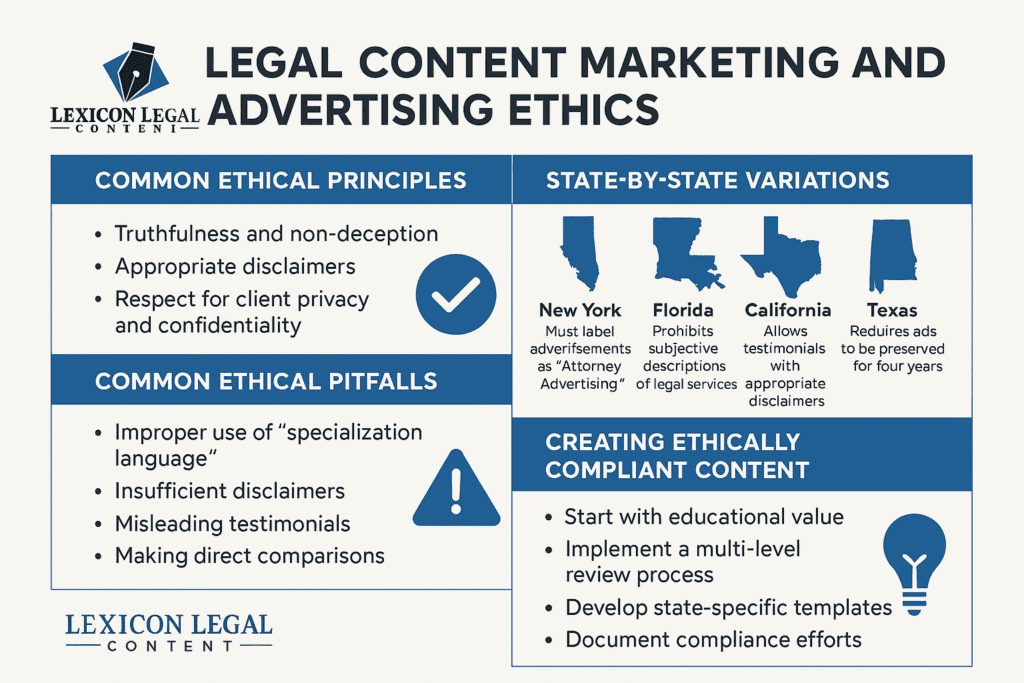Creating eye-catching and profitable content for your law firm requires more than just SEO knowledge and writing skills. Unlike businesses in other industries, law firms need to comply with a complex web of ethical rules that govern attorney advertising and communications. These restrictions can sometimes feel like roadblocks to modern marketing strategies – especially when outrageous claims and puffery has become expected in other industries.
However, effective legal content marketing requires attention to varying state regulations while still allowing you to effectively promote your services and demonstrate your expertise. Fortunately, with proper understanding and planning, you can create compelling content that both attracts clients and adheres to professional standards.
This tightrope walk is one of the main reasons we started Lexicon Legal Content. Early after law school, I realized that it is difficult for law firms and marketing agencies to source and scale law firm content, as there was a lack of writers with the necessary skillet – namely, legal training and SEO know–how – to serve the market.
The Basis of the Ethical Framework
While specific rules vary by jurisdiction, most state bar associations base their regulations on versions of the American Bar Association’s Model Rules of Professional Conduct—particularly Rules 7.1 through 7.3, which address communications concerning a lawyer’s services, advertising, and solicitation.
Core Ethical Principles
Regardless of your jurisdiction, several fundamental principles guide compliant legal marketing. At the heart of these regulations is truthfulness and non-deception – all communications about your services must be factually accurate and cannot mislead potential clients about what you can provide. This principle extends to avoiding guarantees or predictions about case outcomes, as these create expectations that no attorney can ethically promise.
Appropriate disclaimers play a critical role in ethical compliance, with most jurisdictions requiring clear statements that content does not constitute legal advice and does not establish an attorney-client relationship. Privacy and confidentiality considerations are equally important, as marketing content must carefully protect client information even when sharing case studies or results.
Finally, solicitation limitations restrict how directly attorneys can approach potential clients, particularly in vulnerable situations. These core principles form the foundation of ethical legal marketing across all jurisdictions, though the specific implementation varies by state.
State-by-State Variations: Key Considerations

While the fundamental principles are consistent, the specific implementation can vary dramatically between jurisdictions. Here’s how some of the major states approach legal marketing regulations:
New York
New York maintains some of the strictest regulations in the country. Attorney advertisements must include specific disclaimers that identify the content as “Attorney Advertising.”
The state also places significant restrictions on client testimonials, requiring clear statements that results vary and depend on the specific facts of each case. New York attorneys must be particularly careful about making claims regarding specialization, as the state closely regulates how lawyers can describe their practice focus.
Florida
Florida’s Bar enforces detailed rules that go beyond many other jurisdictions. Attorneys practicing in Florida must include disclaimers when discussing their services, and the state explicitly prohibits content that characterizes the quality of legal services without objective verification. Certain types of advertisements must be filed with the Florida Bar for review. Additionally, Florida has specific guidelines governing how past results can be presented, requiring context and appropriate disclaimers.
California
California offers somewhat more flexibility in legal marketing compared to states like New York and Florida. The state allows testimonials with appropriate disclaimers and takes a more lenient approach to comparative statements when they can be factually substantiated. However, California maintains strict rules regarding specialization claims. Attorneys can only claim to be specialists if they’re certified by the California State Bar or another recognized organization in that specific practice area.
Texas
Texas has developed its own distinct approach to regulating attorney advertising. The state requires specific language in disclaimers and places restrictions on the use of trade names. The state also mandates that attorneys preserve copies of their marketing content for at least 4 years, creating additional compliance requirements for content creators.
Common Ethical Pitfalls in Legal Content Marketing
Even experienced and well-intentioned law firm marketers and attorneys can run afoul of ethics rules. This is especially true when they outsource content creation to non-specialized creators. As the saying goes, you don’t know what you don’t know, and a generalist copywriter may not even think to question whether their use of the word “expert” could be a problem
Some of the more common issues that arise in content marketing for law firms include the following:
Improper Use of “Specialization” Language
Most states have specific requirements for claiming specialization in a particular practice area. Unless you’re certified by your state bar or an approved organization in a specialty area, using terms like “specialist” or “specializing in” can violate ethics rules.
This restriction often surprises marketing professionals who commonly use specialization language in other industries. Instead of claiming specialization, describe your experience and focus: “Our practice focuses on personal injury cases” or “Attorney Smith has handled over 100 divorce cases.”
Insufficient Disclaimers
Many jurisdictions require specific disclaimers on attorney websites and blog posts. These typically need to clarify that the content does not establish an attorney-client relationship, is not legal advice, and that past results don’t guarantee future outcomes. The exact wording and placement requirements vary by state, but implementing properly worded disclaimers on your website footer, blog posts, and landing pages is essential for compliance.
Misleading Testimonials and Reviews
Client testimonials can be powerful marketing tools, but they’re heavily regulated in legal marketing. Many jurisdictions restrict how they can be used or require specific disclaimers stating that results vary and depend on the facts of each case. Some states even prohibit certain types of testimonials altogether. When using testimonials, include appropriate disclaimers and ensure they don’t create unjustified expectations about results.
Making Direct Comparisons
Claims like “best attorney in Dallas” or “top DUI lawyer” may violate prohibitions against misleading communications unless they can be factually substantiated.
These superlative claims are standard in general marketing but problematic in legal advertising. Instead, focus on objective credentials: “Board-certified in family law” or “Former prosecutor with 15 years of experience.”
That said, if you want to target the keyword phrase “best attorney in Dallas,” it does not run afoul of the rules to create a “How to Find the Best Attorney in Dallas for You.” This is just one example of how working with an experienced law firm content marketing agency can help you target valuable, high-intent keywords without violating advertising rules.
Sharing Detailed Case Results Without Context
Sharing settlement or verdict amounts without context can create unjustified expectations and potentially violate ethics rules. When discussing case results, include relevant context about the specific facts, circumstances, and legal issues involved, along with appropriate disclaimers about the unique nature of each case.
Creating Ethically Compliant Content: A Framework
Despite these restrictions, you can still create effective, engaging content by following a thoughtful framework that balances compliance with marketing effectiveness.
Start With Educational Value
The safest and most effective approach to legal content marketing begins with educational value. Focus on providing information that genuinely helps potential clients understand legal concepts, processes, and options.
This approach naturally aligns with both marketing best practices and ethical requirements, as educational content tends to avoid many of the common ethical mistakes. When you focus on helping rather than selling, your content becomes both more compliant and more engaging.
Implement a Multi-Level Review Process
Ethical compliance with law firm advertising rules requires more than just a single review. Establish a process that includes multiple perspectives: initial content creation focusing on valuable information, legal review for accuracy and compliance with ethics rules, marketing review for effectiveness and engagement, and final approval by a responsible attorney. This multi-level approach catches potential issues before publication while ensuring the content remains effective from a marketing perspective.
Develop State-Specific Templates and Guidelines
For firms practicing in multiple jurisdictions or content creators working with attorneys across states, creating state-specific templates is invaluable. These templates should include pre-approved language, disclaimers, and formatting that comply with each jurisdiction’s specific rules. This approach streamlines content creation while maintaining compliance, allowing you to scale your content efforts without scaling your risk.
Document Your Compliance Efforts
Maintaining records of your compliance process provides protection if questions ever arise. Document the ethics rules considered in content creation, the review processes followed, sources for factual claims, and copies of published content (which is required in some jurisdictions). This documentation demonstrates your commitment to compliance and provides evidence of your good-faith efforts to adhere to ethical standards.
Stay Current With Rule Changes
Ethics rules evolve over time, and staying current requires ongoing attention. Assign responsibility for monitoring changes to ethics rules and update your content guidelines accordingly.
Many state bars announce rule changes months before implementation, giving you time to adjust your practices. Subscribe to bar association updates and ethics newsletters, and consider scheduling annual reviews of your content policies.
Balancing Ethics and Effectiveness
The most successful legal content marketing strategies treat ethical compliance not as a limitation but as an opportunity to demonstrate your firm’s professionalism and commitment to high standards. By focusing on providing genuine value to potential clients, you can create content that both complies with ethics rules and effectively attracts new business.
For example, rather than making claims about being the “best” firm, you can:
- Explain complex legal concepts in accessible language
- Provide actionable guidance on what to do after an accident
- Walk potential clients through what to expect in a divorce proceeding
- Share insights from your experience without making guarantees
This approach positions your firm as a knowledgeable, helpful resource rather than simply promoting your services—aligning perfectly with both ethical requirements and effective content marketing principles.
Specific Content Types and Their Ethical Considerations
Different content formats present unique ethical challenges and require careful approaches to ensure compliance while maximizing marketing effectiveness.
Blog Posts and Articles
Educational blog posts form the backbone of many law firm content strategies, but they require careful attention to ethics rules.
Ensure factual accuracy in all content and resist the temptation to overstate the impact of legal developments or your firm’s role in significant cases. Include appropriate disclaimers clarifying that the information provided is general in nature and not legal advice. Avoid language that might create unjustified expectations about results, and be particularly careful when discussing recent cases or legal developments that might affect potential clients.
Practice Area Pages
Practice area pages describe your services and expertise, making them particularly sensitive from an ethics perspective. Focus on objective descriptions of your experience rather than subjective claims about quality.
Avoid superlative claims that can’t be substantiated, and include required disclaimers about results and the establishment of attorney-client relationships. Be especially careful with specialization language, ensuring compliance with your jurisdiction’s specific requirements for claiming expertise in practice areas.
Case Results and Testimonials
Content showcasing previous successes requires the most careful handling. Get appropriate client consent before sharing any information about their cases, even if identifying details are removed. Include context about the specific circumstances that led to the outcome rather than simply stating settlement amounts. Ensure truthfulness and representativeness – avoid highlighting only your most successful cases in ways that might create misleading expectations. Finally, be certain to follow your jurisdiction’s specific requirements regarding disclaimers for testimonials and case results.
Videos and Podcasts
Multimedia content presents unique compliance challenges. Include verbal disclaimers at the beginning or end of content, and consider adding text disclaimers in descriptions or accompanying materials. Avoid dramatizations that could be misleading, particularly reenactments of accidents or courtroom scenes that might create unrealistic expectations. Many states have specific regulations that apply to broadcast media, even when distributed online, so check these requirements carefully. Finally, maintain copies of all published videos and podcasts as required by your state’s record-keeping rules.
The Value of an Ethics-Focuses Legal Content Marketing Strategy
Developing a content marketing strategy that proactively addresses ethics rules offers multiple benefits:
- Risk Reduction: Minimizes the risk of ethics complaints or regulatory action
- Brand Enhancement: Demonstrates your firm’s professionalism and attention to detail
- Client Trust: Builds confidence in potential clients who see your commitment to ethical standards
- Marketing Effectiveness: Creates genuinely valuable content that attracts and engages potential clients
By viewing ethics rules as a framework for creating authentic, valuable content rather than obstacles to marketing, your firm can develop a content strategy that both complies with regulations and effectively attracts ideal clients.
Want to ensure your content marketing strategy meets the ethical requirements in your jurisdiction while still driving new business? Contact us for a legal content marketing assessment that includes ethics compliance review tailored to your specific practice areas and location.
About the Author: David Arato, JD, is the founder of Lexicon Legal Content, a specialized agency supporting both law firms and marketing agencies with expertise-driven legal content marketing.
After discovering the challenges of balancing effective marketing with attorney advertising ethics, David assembled a team of former practicing attorneys across multiple practice areas who now exclusively create compliant marketing content for the legal industry. His unique combination of legal knowledge and content expertise helps law firms navigate the ethical complexities discussed in this article.









